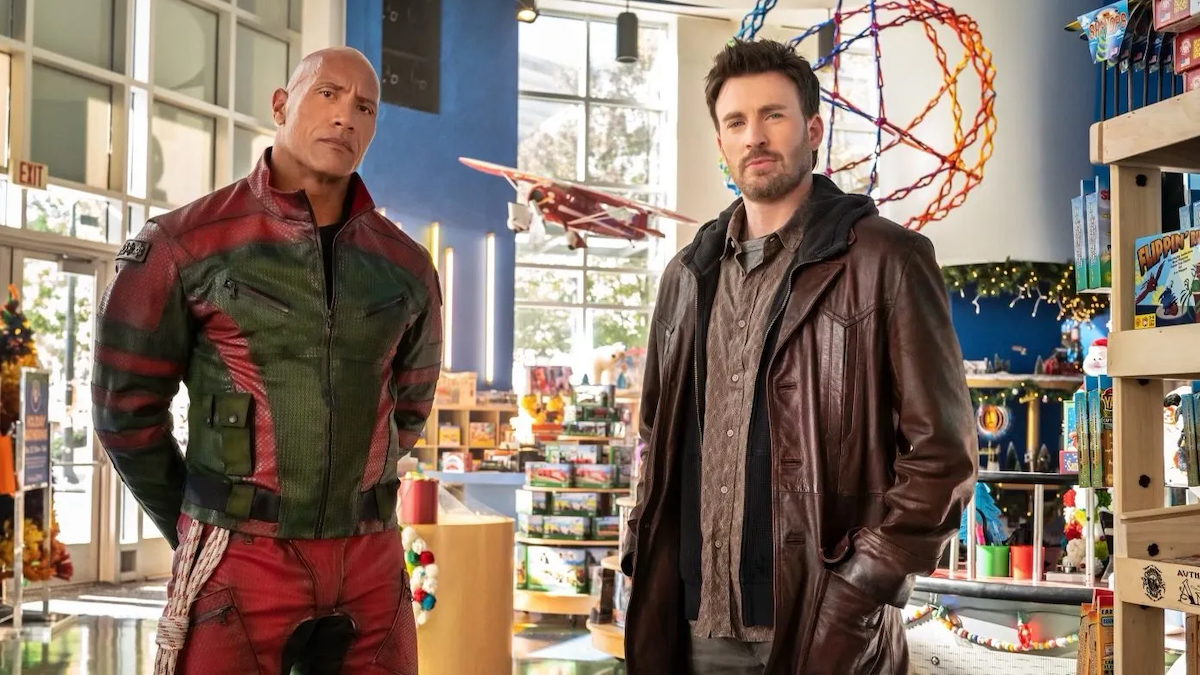
As it turns out, Christmas did not come early this past weekend at the box office, even with a nominal holiday action movie playing in theaters around the world. Indeed, the long troubled and forthcoming Dwayne Johnson and Chris Evans two-hander, Red One, saw its Yuletide hopes dashed over the weekend when estimates came in pegging the Christmas spectacle’s opening at $34 million.
While technically the number one movie in North America, that number is down considerably when even compared to plenty of Johnson’s other family friendly high-concept films like Black Adam (which was considered a disappointment when it opened at $67 million in 2022) and the second Jumanji movie he made with Kevin Hart, Jumanji: The Next Level, which debuted at $59.3 million five years ago in 2019.
Technically Red One’s opening is comparable to Johnson and Hart’s first fun Jumanji flick, Welcome to the Jungle, which opened to $36.1 million in 2017. But that was seven years of inflation ago, and Jungle had a reasonable price tag of $90 million. Conversely, official reports claim Red One cost an eye-watering $200 million, and The Wrap is asserting the real number is closer to $250 million. None of which takes into account marketing.
On paper, Red One was clearly intended to be a continuation of Jumanji’s charm, with director Jake Kasdan helming all three movies. Yet Red One became something else as well: an attempt by an ambitious streamer to create its own family-friendly action IP by spending on Red One like it was a superhero movie. Crucially, however, Amazon MGM originally intended for Red One to be exactly that—a streaming movie. When production began on the film in 2022, the plan was to have Red One on their streaming service Prime Video in time for Christmas the following year. Production pauses, caused by negotiations being dragged out during the acting and writers strikes of last year, delayed the movie until now. And during the interim, Johnson said he got the idea that the movie needed to be on the big screen in IMAX after watching the success of Christopher Nolan’s Oppenheimer in the same format.
Whatever cracks one might wish to make at the folly of comparing intended streaming content starring Johnson and Evans to a talky, R-rated epic for adults, one should note that ahead of Red One, even Johnson’s superhero stumble still actually eked out a north of $50 million opening. So a more interesting way to consider Red One’s failures might be to note that it offers a decent glimpse behind the curtain at the actual popularity of big, pricey streaming movies when their actual appeal isn’t obscured by numbers massaged by the tech industry.
The state of moviemaking is indeed in a strange place where audiences more often than not elect to stay home than go to the cinema on any given weekend, and in that environment streaming services and their owners have the opportunity to remain opaque about what is being watched for how long and by how many people. For instance, another Johnson streaming movie that never got released into theaters, Netflix’s similarly titled Red Notice, was trumpeted by its streamer as its “most popular movie of all-time,” with the film allegedly generating 231 million views since 2021.
Yet the numbers of how many people finished the film or actually enjoyed it (or even gave it their undivided attention) are murkier. There is obviously a world of difference between turning on something that is “free” (or part of a subscription you already paid for) and leaving it on in the background while wrapping presents versus paying $10 to $20 a ticket to see the film with your family ahead of Thanksgiving. But isn’t that also kind of the point? Streaming services continue to be championed as the future of media consumption, or even cinema, and yet their seemingly algorithm-designed content with a tested movie star like Johnson and audience-favorite like Evans cannot generate as much excitement as an original (and sublime) family film, The Wild Robot, which opened at about $36 million in September.
There are of course other conventional lessons that seem gleanable from Red One’s struggles, beginning with its price tag. As of press time, it is not clear if Red One’s exorbitant budget is partially borne out from the streaming model of paying above-the-line talent expanded fees to offset the films never having the opportunity to earn backends for the talent in a traditional theatrical rollout—which is why Amazon’s adult drama Air cost a reported $90 million, even though the non-salaried portion of that production was probably a fraction of the total—or if this is just the case of another Rock movie costing north of $200 million.
According to The Wrap, though, Johnson alone demanded a $50 million payday and then allegedly caused the budget to balloon further by being chronically late to set. Producer Hiram Garcia categorically denied this allegation.
Whatever the case might be, it seems ill-advised to spend anywhere in the neighborhood of a quarter-billion dollars on a Christmas movie. We’ve written before about how the industry went from reliably producing a few generally recognized Christmas favorites every decade to there not being a banner year for holiday classics since 2003. A large reason for that is the holiday movie has been surrendered to streaming services, which often treat them as disposable shovel programmer content. Conversely, attempting to rework the plot of 48 Hrs. or Lethal Weapon into a family movie with expensive talking polar bears and fist-fighting Krampuses seems equally tone deaf.
Many of the celebrated holiday movies of yore, including 2003’s Elf and Love Actually, were medium-budgeted movies that relied on quality talent in front of and behind the camera delivering the ephemeral “magic.” In other words, the best Christmas movies didn’t try to just buy their popularity with special effects, or just phone “the magic” in, a la every Netflix Christmas movie you might watch this holiday season and have forgotten by New Year’s.
Red One conversely feels like every other streaming service blockbuster that you might watch but regret afterward. Granted, not all audiences feel the same. It should be noted the film earned a respectable “A-” CinemaScore over the weekend, which is better than Black Adam’s “B+.” However, lest anyone has delusions of a long holiday season attempt to recover, it should be noted the traditional studios already seem to have the family market cornered with Universal’s highly anticipated Wicked slated to make landfall next week and, ironically enough, the Johnson co-starring Moana 2 from Disney prepared to open the weekend afterward. Just in time for the holidays.
The post Red One’s Box Office Coal Raises Eyebrows Over Spending $200+ Million on Christmas Movie appeared first on Den of Geek.












